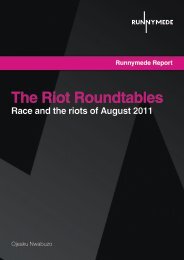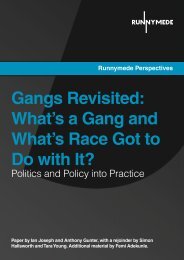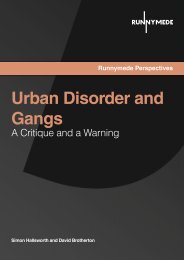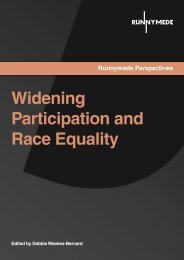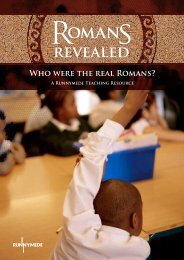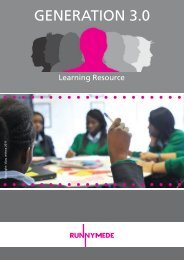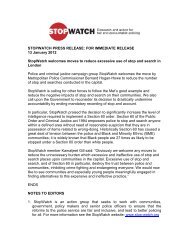PARENTINg - Runnymede Trust
PARENTINg - Runnymede Trust
PARENTINg - Runnymede Trust
Create successful ePaper yourself
Turn your PDF publications into a flip-book with our unique Google optimized e-Paper software.
A VIEW FROM...<br />
USA<br />
This article by David J. Pate, Jr. outlines the history of African American<br />
fatherhood. It explains how policymakers have shaped and often undermined<br />
the position of African American fathers, and allows us to reflect on how policy<br />
should – and should not – respond to the question of ‘fatherhood’ in the UK<br />
‘Family’ policies have typically<br />
affected men and women differently,<br />
historically promoting the notion of men<br />
as the ‘breadwinner’ and women as<br />
‘homemakers’. Such policies have also<br />
addressed ethnic groups differently,<br />
and have been far from benign. Policy<br />
makers and researchers have only<br />
recently explicitly discussed ‘fatherhood’,<br />
although assumptions regarding the<br />
responsibilities of fatherhood have taken<br />
various forms in the United States since<br />
colonial times. The present discourse<br />
focuses on the roles that fathers should<br />
play, particularly for families affected by<br />
welfare reauthorisation and the recent<br />
recession. It focuses on a particular<br />
notion of ‘responsibility’, namely that<br />
fathers should be financially responsible<br />
for their entire family, and in its extreme<br />
version suggests that economic support<br />
is the only or main marker of a good father.<br />
Historical background<br />
These developments have taken place in<br />
a particular context for African American<br />
fathers, namely the long history of slavery<br />
and discrimination that continues to<br />
have effects both on fathers and on the<br />
imaginations of policy makers. On 20<br />
August 1619, the first black Africans<br />
arrived in Jamestown, Virginia. The values<br />
and traditions of family structure as these<br />
Africans knew and practised them in their<br />
home country would be changed forever.<br />
In 1662, slavery received legal statutory<br />
sanction and was made hereditary, and in<br />
1705 an Act was passed in Virginia which<br />
made Negro slaves real property. Slavery<br />
then flourished as a cruel and inhumane<br />
institution, rendering the psychological<br />
state of black Africans impotent.<br />
The combined practice of slavery and the<br />
associated racism has had a cumulative<br />
effect on the structure of the African<br />
American family. United States federal<br />
law did not allow black African slaves to<br />
be legally married, own property, or travel<br />
freely without fear of death. Moreover,<br />
legal statutes have until recently not<br />
allowed African American fathers in<br />
low-income families to fully participate as<br />
fathers in their families. The effect on the<br />
slave father’s authority was crippling:<br />
The slaveholders deprived<br />
black men of the role of<br />
provider; refused to dignify<br />
their marriages or legitimise<br />
their issue; compelled them<br />
to submit to physical abuse in<br />
the presence of their wife and<br />
children: made them choose<br />
between remaining silent while<br />
their wives and daughters were<br />
raped or seduced and risking<br />
death; and threatened them with<br />
separation from their family at<br />
any moment. (Genovese, 1976,<br />
p. 490)<br />
The white master almost wholly<br />
circumscribed the father’s ability to<br />
be nurturing and involved. The slave<br />
master could forbid marriage. He could<br />
sell the male slave’s wife and children.<br />
He determined if the father was sold to<br />
another plantation despite his family’s<br />
pleas. All of this maintained power and<br />
control over the mental capacity of the<br />
slave and reduced him to being less than<br />
a man. However, there is documented<br />
evidence of slave fathers, in fear of sale,<br />
establishing a symbolic connection with<br />
their children: it was a common practice<br />
to give the name of the father to the<br />
first-born son (Gutman, 1976). Another<br />
example of resistance to separation from<br />
one’s family was the act of ‘self-mutilation’<br />
– slave fathers cutting off toes, hands,<br />
and other body parts as a way to render<br />
themselves ineffective as workers, and<br />
hopefully to remain on the plantation.<br />
Slavery would last for 246 years until it<br />
was abolished by the 13th constitutional<br />
amendment. After 1865 African American<br />
men could theoretically hold office,<br />
serve on juries, and vote. However, ‘Jim<br />
Crow’ laws and persistent racism fatally<br />
undermined federal legislation and<br />
further challenged the role of the African<br />
American father.<br />
The lingering effects from this historical,<br />
institutionalised, and legalised racism<br />
have resulted in housing discrimination,<br />
poor employment prospects, and<br />
poor educational opportunities, further<br />
affecting the experience of black<br />
fatherhood.<br />
. The white master<br />
almost wholly<br />
circumscribed the father’s<br />
ability to be nurturing and<br />
caring<br />
Contemporary fatherhood policy:<br />
the dominance of the welfare lens<br />
Partly because of these barriers, many<br />
of the recipients (or targets) of policies<br />
for responsible fatherhood programmes<br />
in the United States are black men.<br />
These men are the subjects of increasing<br />
policy focus, with current concern about<br />
fatherlessness and ‘deadbeat dads’ in<br />
the social and economic arenas reducing<br />
the duties and responsibilities of a father<br />
to a one-dimensional identity – the<br />
breadwinner.<br />
The current concern with the role of fathers<br />
of children on welfare can be attributed<br />
to current societal mores, concern for the<br />
22 | RUNNYMEDE BULLETIN | Autumn 2011 / issue 367 www.runnymedetrust.org



